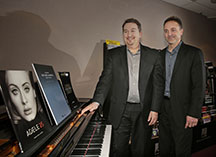Music firm benefits with rights to big hits from Adele, ‘Star Wars’

Larry Morton, left, president of Hal Leonard Corp., and Jeff Schroedl, executive vice president, are excited about recent additions to their print music rights to most popular music, including the sheet music for both the new Adele album and the new Star Wars soundtrack. (Rick Wood/Milwaukee Journal Sentinel/TNS)
January 25, 2016
By Rick Romell
MILWAUKEE — They’re jazzed over at Hal Leonard Corp.
The firm already is the self-described biggest print music publisher in the world — $170 million in annual sales, 550 employees worldwide, and a Milwaukee headquarters team that includes 45 crack musician-editors who analyze and get the feel for original works, then distill their essence for players of varying skill levels.
Now, the company finds itself with the sheet-music equivalent of a two-sided smash:
It holds the print and digital publishing rights to both the chart-topping “25” album by Adele and the soundtrack for box-office blockbuster “Star Wars: The Force Awakens.”
It’s not just that they figure to be big sellers, though they do. Embedded in those expectations is the type of music involved.
“Both are big game changers in terms of how they affect our world of people who play music,” said Hal Leonard President Larry Morton, himself a lifelong musician and holder of undergraduate (Eastern Illinois University) and graduate (University of North Texas) degrees in music theory.
“It’s one thing to listen to it and love it. It’s another thing when you listen to something and say, ‘I want to play this, I really want to play this.’”
Not every hit translates well to sheet music. Some pop and rap songs can be hugely popular and fun to listen to, Morton said, but not inspire you to sit down at the piano or pick up your guitar.
Adele does. The music of the soulful British singer and songwriter “really lays down beautifully for piano and voice,” Morton said.
The likely result: Even more sales for Hal Leonard’s “25” publications than the quarter-million it has sold from Adele’s last album, “21.”
“The Force Awakens,” meanwhile, promises to become a staple in high-school auditoriums everywhere.
“In the school music side of our business, it’ll be No. 1 in 2016 by a long shot,” Morton said.
That sounds about right to Guy Kammerer. A band director for nearly 30 years — the last five at Wisconsin’s Wauwatosa West High School — he recently took his music-theory class on a field trip to Hal Leonard.
“I would agree with the folks over there,” Kammerer said of the general prospects for “Star Wars.” “It’s going to be a big seller. As a matter of fact, I was planning on buying it myself.”
But even more important than the incremental boost from a pair of hit properties, Morton said, is the potential effect on Hal Leonard’s back catalog, which accounts for the great majority of its sales.
“They inspire people to play,” Morton said of Adele and the “Star Wars” music. “Which means we sell more of our other publications.”
There’s a lot to sell. The company has more than 200,000 publications and products, and holds rights to everyone from AC/DC and the Beatles to Yanni and ZZ Top.
Hal Leonard has begun releasing sheet music for both the new Adele album and “The Force Awakens,” with plans over the next few months to put out 25 different Adele publications and 42 for “The Force Awakens.”
The “Star Wars” score will emerge in arrangements for everything from professional orchestras to school bands. Adele will be presented not just for piano but for guitar, vocal and even for the resurgent ukulele.
“For the last four, five years we’re just selling tons of ukulele everything,” Morton said. “We did Metallica for ukulele. It’s crazy. Ukulele has become its own kind of universe.”
Hal Leonard has a printing plant in Winona, Minn., but the company doesn’t simply receive original music and run off copies.
“You have to reduce sometimes really complicated music into the simplest form,” Morton said, “and yet retain the character of the music itself.”
That’s where the people he calls editors come in. Besides the headquarters team, the company taps freelancers nationwide who specialize in particular instruments or genres — jazz, show tunes, ukulele, banjo.
“These are really high-level musicians,” Morton said. “They’ve got the lucky DNA where they can hear the music (and) instantly know what it is. But they also have formal training from music theory, and they understand all the nuances of key signature and chord structure and how music has to be represented.
“Music’s complicated.”
Before it gets published, their work must be approved, sometimes by the artists or composers themselves. In the case of “Star Wars: The Force Awakens,” Hal Leonard had something of a running start.
“We’re very close with (composer) John Williams,” Morton said. “And so in the months leading up to the release of the film, we were on the phone with Mr. Williams, and we were getting audio shared with us in advance so that we could see the score evolving.”
With details of the movie tightly guarded before its release, the editors had to sign nondisclosure agreements as they worked with the music.
Hal Leonard’s revenue was up slightly from 2014, when it benefited from interest in the “Frozen” soundtrack.
“Our profile is kind of steady-Eddie growth and profitability,” Morton said.
Further opportunity awaits, though, if Hal Leonard could land rights to some of the minority of big artists who have eluded it so far. Led Zeppelin, for one. And Bruce Springsteen.
“We have the lion’s share, but there’s music we don’t yet have,” Morton said. “We’re trying, though.”
———
©2016 Milwaukee Journal Sentinel
Visit the Milwaukee Journal Sentinel at www.jsonline.com
Distributed by Tribune Content Agency, LLC.







